UNICEF
See the following -
Advancing 'Health for All' through Telemedicine: Intelehealth joins Digital Public Goods Alliance
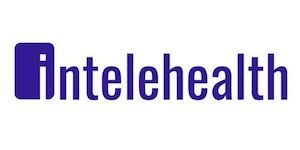 Intelehealth was added to the Digital Public Goods Alliance DPG Registry last week. This underscores Intelehealth's commitment to developing and championing digital public goods that will help achieve 'Health for All' and contribute to the Sustainable Development Goals (SDGs). Intelehealth is a non-profit delivering high-quality healthcare for the last -mile population where there is no doctor through telemedicine. Using our open-source technology platform that's driven by an innovative digital health assistant, we connect patients and frontline health workers at the last mile with qualified doctors, diagnostics & medications.
Intelehealth was added to the Digital Public Goods Alliance DPG Registry last week. This underscores Intelehealth's commitment to developing and championing digital public goods that will help achieve 'Health for All' and contribute to the Sustainable Development Goals (SDGs). Intelehealth is a non-profit delivering high-quality healthcare for the last -mile population where there is no doctor through telemedicine. Using our open-source technology platform that's driven by an innovative digital health assistant, we connect patients and frontline health workers at the last mile with qualified doctors, diagnostics & medications.
- Login to post comments
Africa’s First Humanitarian Drone Testing Corridor Launched in Malawi
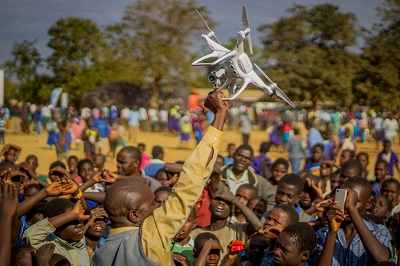 The Government of Malawi and UNICEF today launched an air corridor to test potential humanitarian use of unmanned aerial vehicles (UAVs), also known as drones. The corridor is the first in Africa and one of the first globally with a focus on humanitarian and development use. It is centred on Kasungu Aerodrome, in central Malawi, with a 40km radius (80km diameter) and is designed to provide a controlled platform for the private sector, universities and other partners to explore how UAVs can be used to help deliver services that will benefit communities...
The Government of Malawi and UNICEF today launched an air corridor to test potential humanitarian use of unmanned aerial vehicles (UAVs), also known as drones. The corridor is the first in Africa and one of the first globally with a focus on humanitarian and development use. It is centred on Kasungu Aerodrome, in central Malawi, with a 40km radius (80km diameter) and is designed to provide a controlled platform for the private sector, universities and other partners to explore how UAVs can be used to help deliver services that will benefit communities...
- Login to post comments
After Ebola, Liberia’s Health System on Path to Recovery
Shirley Kamara, 37, an expectant mother, smiled as she received medical care at C.H. Rennie Hospital in Kakata, just over 40 miles (68 km) north of Monrovia. “Our hospital is far better now since the Ebola outbreak,” she said. “We are encouraging our people to come here because everything is getting better.” C.H. Rennie Hospital in Liberia’s Margibi County was one of the facilities hardest-hit during the Ebola Virus Disease (EVD) outbreak in 2014; 14 of its health workers died...
- Login to post comments
Bahmni, OpenMRS recognized as Digital Public Goods by Digital Public Goods Alliance
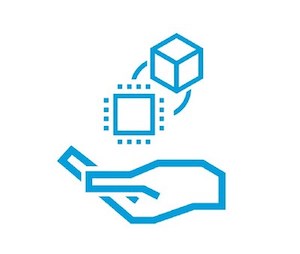 Bahmni, an open source Electronic Medical Record (EMR) governed by the Bahmni Coalition, was added to the Digital Public Goods Alliance's DPG Registry. ThoughtWorks, a global software consultancy is part of the Bahmni Coalition's core governing committee and was instrumental in conceiving and building Bahmni during its early years. The Digital Public Goods Alliance (DPGA) and its registry promotes digital public goods in order to create a more equitable world. To become a digital public good, projects are required to meet the DPG Standard ensuring they truly encapsulate open-source principles. Bahmni is one of only 23 projects deemed digital public goods out of more than 500 nominations. The Hospital Information System (HIS) and EMR is a seamless integration of three critical systems: patient medical records, laboratory management and billing. Bahmni has been built on top of OpenMRS, OpenELIS, OpenERP and cm4Chee, an OSS Radiology PACS Server - to be a user-intuitive system customized for use in low-resource areas with limited bandwidth and infrastructure.
Bahmni, an open source Electronic Medical Record (EMR) governed by the Bahmni Coalition, was added to the Digital Public Goods Alliance's DPG Registry. ThoughtWorks, a global software consultancy is part of the Bahmni Coalition's core governing committee and was instrumental in conceiving and building Bahmni during its early years. The Digital Public Goods Alliance (DPGA) and its registry promotes digital public goods in order to create a more equitable world. To become a digital public good, projects are required to meet the DPG Standard ensuring they truly encapsulate open-source principles. Bahmni is one of only 23 projects deemed digital public goods out of more than 500 nominations. The Hospital Information System (HIS) and EMR is a seamless integration of three critical systems: patient medical records, laboratory management and billing. Bahmni has been built on top of OpenMRS, OpenELIS, OpenERP and cm4Chee, an OSS Radiology PACS Server - to be a user-intuitive system customized for use in low-resource areas with limited bandwidth and infrastructure.
- Login to post comments
Bill Gates Won’t Save You From The Next Ebola
In late August 2014, Tom Frieden, then director of the Centers for Disease Control and Prevention, traveled to West Africa to assess the raging Ebola crisis. In the five months before Frieden’s visit, Ebola had spread from a village in Guinea, across borders and into cities in Liberia and Sierra Leone. Médecins Sans Frontières, the first international responder on the scene, had run out of staff to treat the rising numbers of sick people and had deemed the outbreak “out of control” back in June...
- Login to post comments
Bill Gates Won’t Save You From The Next Ebola Outbreak
 In late August 2014, Tom Frieden, then director of the Centers for Disease Control and Prevention, traveled to West Africa to assess the raging Ebola crisis. In the five months before Frieden’s visit, Ebola had spread from a village in Guinea, across borders and into cities in Liberia and Sierra Leone. Médecins Sans Frontières, the first international responder on the scene, had run out of staff to treat the rising numbers of sick people and had deemed the outbreak “out of control” back in June...
In late August 2014, Tom Frieden, then director of the Centers for Disease Control and Prevention, traveled to West Africa to assess the raging Ebola crisis. In the five months before Frieden’s visit, Ebola had spread from a village in Guinea, across borders and into cities in Liberia and Sierra Leone. Médecins Sans Frontières, the first international responder on the scene, had run out of staff to treat the rising numbers of sick people and had deemed the outbreak “out of control” back in June...
- Login to post comments
Condom Airborne Meds: 6 Ways Drones Could Change Health Care
 Drones have been used to deliver sunscreen to a conference in Palm Springs, Calif., and pizza to a family in New Zealand, but they’re also in the air for far more urgent purposes — such as saving lives. In fact, in some cases, drones could carry defibrillators to heart attack victims faster than an ambulance, according to a paper published Tuesday in the Journal of the American Medical Association. Researchers simulated emergency situations and found they could get automatic external defibrillators to the scene an average of 16 minutes faster by drone than by ambulance...
Drones have been used to deliver sunscreen to a conference in Palm Springs, Calif., and pizza to a family in New Zealand, but they’re also in the air for far more urgent purposes — such as saving lives. In fact, in some cases, drones could carry defibrillators to heart attack victims faster than an ambulance, according to a paper published Tuesday in the Journal of the American Medical Association. Researchers simulated emergency situations and found they could get automatic external defibrillators to the scene an average of 16 minutes faster by drone than by ambulance...
- Login to post comments
Dedicated Engineering Team in South Africa Deploys Open Source Tools, Save Lives
 In 2006, a groundbreaking TED talk used statistics to reveal surprising insights about the developing world, including how many people in South Africa have HIV despite free and available anti-retroviral drugs. Gustav Praekelt, founder of Praekelt.org, heard this TED talk and began tenaciously calling a local hospital to convince them to start an SMS program that would promote anti-retrovirals. The program that resulted from those calls became txtAlert—a successful and widely recognized mobile health program that dramatically improves medical appointment adherence and creates a free channel for patients to communicate with the hospital...
In 2006, a groundbreaking TED talk used statistics to reveal surprising insights about the developing world, including how many people in South Africa have HIV despite free and available anti-retroviral drugs. Gustav Praekelt, founder of Praekelt.org, heard this TED talk and began tenaciously calling a local hospital to convince them to start an SMS program that would promote anti-retrovirals. The program that resulted from those calls became txtAlert—a successful and widely recognized mobile health program that dramatically improves medical appointment adherence and creates a free channel for patients to communicate with the hospital...
- Login to post comments
Drones and the Future of Disaster Response
 Four continental states and one U.S. territory took a beating this fall as one natural disaster after another rocked communities in Northern California and along the Gulf Coast, spreading disaster relief resources and personnel thin as federal, state, and local governments scrabbled to address the crises. Wildfires in California's wine country claimed at least 42 lives, 8,400 structures, and 245,000 acres of land in October. Hurricanes Harvey and Irma pummeled Louisiana, Texas, and Florida only to be followed by Hurricane Maria, which slammed Puerto Rico on September 20 and left much of the U.S. territory without communications systems, electricity, clean water, or functioning hospitals....
Four continental states and one U.S. territory took a beating this fall as one natural disaster after another rocked communities in Northern California and along the Gulf Coast, spreading disaster relief resources and personnel thin as federal, state, and local governments scrabbled to address the crises. Wildfires in California's wine country claimed at least 42 lives, 8,400 structures, and 245,000 acres of land in October. Hurricanes Harvey and Irma pummeled Louisiana, Texas, and Florida only to be followed by Hurricane Maria, which slammed Puerto Rico on September 20 and left much of the U.S. territory without communications systems, electricity, clean water, or functioning hospitals....
- Login to post comments
Every Picture Tells a Story, and Nowhere More Important Than in Health
A picture’s not only worth the proverbial thousand words, but can save a life. So can a t-shirt…er, TeachShirt. At the Unniched meeting held on 25 October 2011 in NYC, I spent a few minutes talking with two members of Zemoga‘s brain trust: Sven Larsen, Chief Marketing Office, and the firm’s Principal Design guru, Dan Licht. Read More »
- Login to post comments
Hackathons Bring Open Source Innovation to Humanitarian Aid
 In open source software, end users, decision makers, subject matter experts, and developers from around the world can work together to create great solutions. There are a lot of mature open source projects out there already in the field of humanitarian and development aid, for example: Ushahidi and Sahana in crisis management and information gathering, OpenMRS for medical records, Martus for secure information sharing in places with limited freedom of speech, and Mifos X, an open platform for financial inclusion for people in poor areas where financial services such as savings, payments, and loans are not offered...
In open source software, end users, decision makers, subject matter experts, and developers from around the world can work together to create great solutions. There are a lot of mature open source projects out there already in the field of humanitarian and development aid, for example: Ushahidi and Sahana in crisis management and information gathering, OpenMRS for medical records, Martus for secure information sharing in places with limited freedom of speech, and Mifos X, an open platform for financial inclusion for people in poor areas where financial services such as savings, payments, and loans are not offered...
- Login to post comments
HLN's Immunization Calculation Engine (ICE) chosen as a Digital Public Goods Standard
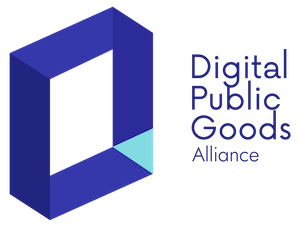 HLN Consulting is thrilled to announce that the Immunization Calculation Engine (ICE) project has been chosen by the Digital Public Goods Alliance (DPGA) as an innovative openly licensed technology and listed in their Digital Public Goods registry. Technologies included in the list are considered to be digital public goods in alignment with the Digital Public Goods Standard. ICE now appears in the Digital Public Goods registry where it is discoverable as a digital public good and reflected on a growing network of catalogs and aggregated lists of digital public goods.
HLN Consulting is thrilled to announce that the Immunization Calculation Engine (ICE) project has been chosen by the Digital Public Goods Alliance (DPGA) as an innovative openly licensed technology and listed in their Digital Public Goods registry. Technologies included in the list are considered to be digital public goods in alignment with the Digital Public Goods Standard. ICE now appears in the Digital Public Goods registry where it is discoverable as a digital public good and reflected on a growing network of catalogs and aggregated lists of digital public goods.
- Login to post comments
How Healthy Are We?
Reliable data on health is an essential part of a comprehensive health information system, which is central to evidence-informed, responsive decision-making for better public health program. A well-functioning health information system also helps policy-makers and program managers to monitor population health and plan interventions accordingly. In line with the vision of a Digital Bangladesh, one of the more significant changes that have happened in our health sector is transforming paper-based health reporting into an electronic health information system, along with initiating a medical record system through the Open MRS software...
- Login to post comments
Kenya Creates Online System to Monitor Rural Sanitation
 Kenya has launched an online monitoring, evaluation and reporting system to improve capturing of data on sanitation and hygiene status, a conference has heard. According to Kenya’s Ministry of Health, the country has open defecation rate of 14 per cent, with countries such as Wajir and Turkana having a rate of 76.7 and 82.2 per cent respectively. The online portal could help coordinate monitoring of water, sanitation and hygiene (WASH), and enable public health officials in rural areas facilitate rapid acceleration of the Open Defecation Free (ODF) campaign, experts say...
Kenya has launched an online monitoring, evaluation and reporting system to improve capturing of data on sanitation and hygiene status, a conference has heard. According to Kenya’s Ministry of Health, the country has open defecation rate of 14 per cent, with countries such as Wajir and Turkana having a rate of 76.7 and 82.2 per cent respectively. The online portal could help coordinate monitoring of water, sanitation and hygiene (WASH), and enable public health officials in rural areas facilitate rapid acceleration of the Open Defecation Free (ODF) campaign, experts say...
- Login to post comments
New Open Source App Helps Protect Children Displaced by Conflict
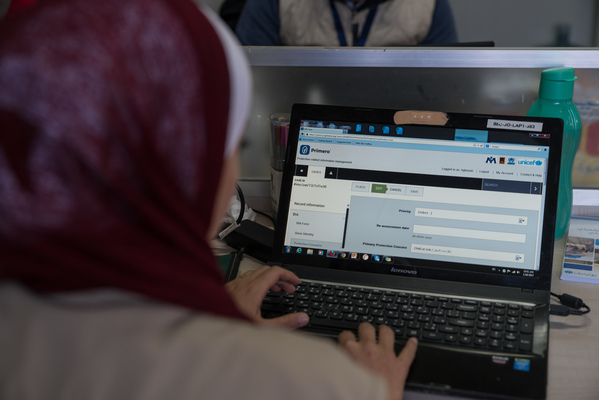 A life–saving service for vulnerable children caught up in crises is now available to government, aid agencies and social service workers through an open source app developed by UNICEF and its partners. The app known as Primero, facilitates the secure collection, storage and sharing of data to improve child protection, incident monitoring and family reunification services by key players in the humanitarian sector. The software is particularly crucial to the work of social workers in emergency situations to support children displaced by conflict...
A life–saving service for vulnerable children caught up in crises is now available to government, aid agencies and social service workers through an open source app developed by UNICEF and its partners. The app known as Primero, facilitates the secure collection, storage and sharing of data to improve child protection, incident monitoring and family reunification services by key players in the humanitarian sector. The software is particularly crucial to the work of social workers in emergency situations to support children displaced by conflict...
- Login to post comments